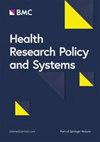Qualitative assessment of evidence-informed adolescent mental health policymaking in India: insights from project SAMA
IF 3.6
2区 医学
Q1 HEALTH POLICY & SERVICES
引用次数: 0
Abstract
The importance of evidence-informed health policymaking is widely recognized. However, many low- and middle-income countries lack evidence-informed mental health policies due to insufficient data, stigma or lack of resources. Various policies address adolescent mental health in India, but published knowledge on their evidence-informed nature is limited. In this paper, we report results of our analysis of the role of evidence in adolescent mental health policymaking in India. This paper reports findings from the document analysis of key policy documentation (n = 10) and in-depth interviews with policy actors including policymakers, researchers, practitioners and intermediaries (n = 13). Framework analysis was used, informed by the components of a conceptual framework adapted from the literature: actors, policy and evidence processes, nature of evidence itself and contextual influences. Results show that adolescent mental health policies in India were generally evidence-informed, with more key evidence becoming generally available from 2010 onwards. Both formal and informal evidence informed mental health policies, particularly agenda-setting and policy development. Mental health policymaking in India is deemed important yet relatively neglected due to competing policy priorities and structural barriers such as stigma. Use of evidence in mental health policymaking reflected differing values, interests, relative powers and ideologies of policy actors. Involvement of government officials in evidence generation often resulted in successful evidence uptake in policy decisions. Policy actors often favoured formal and quantitative evidence, with a tendency to accept global evidence that aligns with personal values. There is a need to ensure a balanced and complementary combination of formal and informal evidence for policy decisions. Evidence generation, dissemination and use for policy processes should recognize evidence preferences by key stakeholders, while prioritizing locally available evidence where possible. To help this, a balanced involvement of policy actors can ensure complementary perspectives in evidence production and policy agendas. This continued generation and promotion of evidence can also help reduce societal stigma around mental health and promote mental health as a key policy priority.对印度青少年心理健康循证决策的定性评估:SAMA 项目的启示
循证卫生决策的重要性已得到广泛认可。然而,许多中低收入国家由于数据不足、污名化或缺乏资源,缺乏循证的心理健康政策。在印度,针对青少年心理健康的政策多种多样,但有关其循证性质的公开知识却十分有限。在本文中,我们将报告我们对印度青少年心理健康政策制定中的循证作用的分析结果。本文报告了对主要政策文件(n=10)的文档分析结果,以及对政策制定者、研究人员、从业人员和中介机构等政策参与者(n=13)的深入访谈结果。根据从文献中改编的概念框架的组成部分:参与者、政策和证据过程、证据本身的性质和背景影响,采用了框架分析法。结果表明,印度的青少年心理健康政策总体上是有据可依的,从 2010 年起,更多的关键证据开始普遍可用。正式和非正式的证据都为心理健康政策,特别是议程设置和政策制定提供了依据。在印度,心理健康政策的制定被认为是重要的,但却相对被忽视,原因在于政策优先事项的竞争和结构性障碍,如污名化。心理健康政策制定中对证据的使用反映了政策参与者不同的价值观、利益、相对权力和意识形态。政府官员参与证据的生成,往往能成功地在政策决策中采纳证据。政策制定者往往偏爱正式的定量证据,倾向于接受符合个人价值观的全球性证据。有必要确保政策决策中正式和非正式证据的平衡和互补。政策过程中的证据生成、传播和使用应认识到主要利益相关方对证据的偏好,同时在可能的情况下优先考虑当地可用的证据。为此,政策参与者的均衡参与可确保证据生成和政策议程的互补性。持续生成和推广证据还有助于减少社会对心理健康的偏见,促进心理健康成为政策的重中之重。
本文章由计算机程序翻译,如有差异,请以英文原文为准。
求助全文
约1分钟内获得全文
求助全文
来源期刊

Health Research Policy and Systems
HEALTH POLICY & SERVICES-
CiteScore
7.50
自引率
7.50%
发文量
124
审稿时长
27 weeks
期刊介绍:
Health Research Policy and Systems is an Open Access, peer-reviewed, online journal that aims to provide a platform for the global research community to share their views, findings, insights and successes. Health Research Policy and Systems considers manuscripts that investigate the role of evidence-based health policy and health research systems in ensuring the efficient utilization and application of knowledge to improve health and health equity, especially in developing countries. Research is the foundation for improvements in public health. The problem is that people involved in different areas of research, together with managers and administrators in charge of research entities, do not communicate sufficiently with each other.
 求助内容:
求助内容: 应助结果提醒方式:
应助结果提醒方式:


